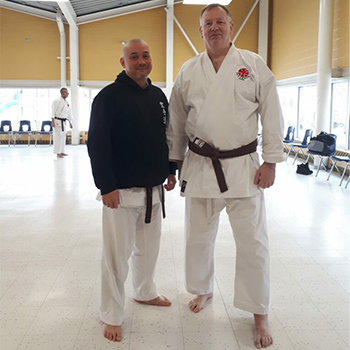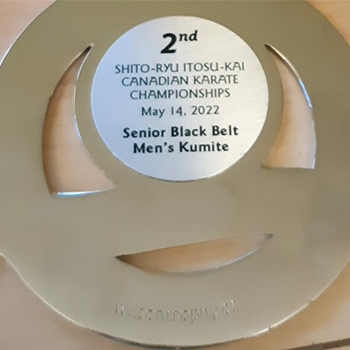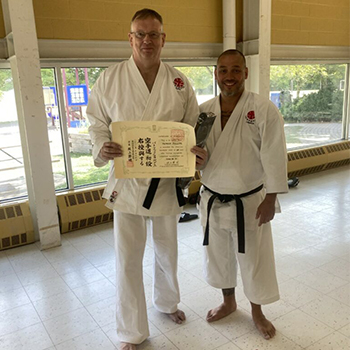Patrick Phillips, an assistant professor in the Department of Philosophy in the Faculty of Liberal Arts & Professional Studies (LA&PS), combines the rigours of the academy with an ancient and revered form of martial arts and through his journey, he is changing lives.
As a youth living in a rough suburb during the fraught economic decline that characterized England in the 1970s, LA&PS assistant professor Patrick Phillips could have chosen a life of crime. Instead, through a thoughtful twist of fate, Phillips was encouraged to pursue martial arts as an outlet for his youthful energy. Little did he know that by following this wise recommendation, it would lead to a multifaceted and highly productive life where he shares his knowledge with others, and changes lives.
Phillips, who is an assistant professor of philosophy at York University, has adeptly combined his dual roles in the classroom and the dojo (training hall), as both an effective post-secondary instructor and karate sensei, mentoring to youth in a Scarborough neighbourhood.
He notes that the benefits of karate, both personal and professional, have been profound and life changing. “Growing up in a rough suburb of Liverpool in the U.K. in the 1970s I was encouraged to take martial arts lessons. I found the [martial arts] practice worked well for my self esteem and sense of self worth and gave me confidence. Perhaps counterintuitively, the practice helped me establish healthy relationships and a sense of camaraderie and as a young person, time in the dojo kept me away from the streets, where my time would not have been constructively spent,” says Phillips. “In essence, the practice of karate made me an empath and a pacifist.”
Phillips, who began teaching at York University in 1997, is a three-time teaching award winner as the recipient of the President’s University-wide Teaching Award (2003), York International’s Teaching Award (2004) and in 2019, he was the recipient of the Dean’s Award for Excellence in Teaching. However, these extraordinary accomplishments in the academy came with a cost and to create balance his life, he returned to karate. “As I entered my fifties in Canada, I realized that the academic life (which can be overly cerebral and sedentary) was taking its toll on my health. So, I returned to what I knew and loved as a teenager, the practice of karate-do,” says Phillips.


For more than five years since making that choice, Phillips has pursued the Shito-Ryu style of karate, or “empty hand way.” He practices at the headquarters or “Honbu” of the style in Toronto. (For more information, visit the Karate Toronto website.) His education and training have taken place under his teacher, Sensei Daniel Tsumura, who is a sixth-degree black belt and the head of the Shito-Ryu School of Karate in Canada. Through this study, Phillips earned his first-degree black belt (Shodan) in 2022. He is now paying it forward in his “secret life” role as a karate sensei to young people in the Scarborough dojo located in the Ellesmere Community Centre.
In addition to his professional achievements in the academy, the personal accomplishments associated with his martial arts practice have been tremendous for this soft-spoken academic with a lilting Liverpool accent. “Traditional karate emphasizes the perfection of form and control (when contrasted with more applied forms of combat such as jujitsu). The fight (or perhaps struggle) in karate is therefore with oneself. A struggle to bring one’s own body and mind under control, even under duress,” notes Phillips. “My interest ranges from the history of karate from its genesis about 150 years ago (karate is in fact a very modern martial art) to the exploration of the Western mind/body distinction which does not find its direct parallel in the Japanese tradition. Practice of the karate forms or ‘kata’ (think of it as a martial dance) always reveals surprises, realizations and hidden applications. The practice of karate is both fascinating and profound.”
He encourages anyone he meets to consider adding a martial arts practice to their lives, although, obviously, he is very partial to karate. “Traditional karate does have self-defense applications, which can provide piece of mind to many practitioners. Many are also intrigued by the beauty of the kata. The perfection of which may take a lifetime, explains Phillips.
“For those more competitively minded, Shito-Ryu Karate has a sport element where competitors may practice their kata in front of senior black belts under a point system or take part in semi-contact fighting (kumite) bouts, again under a point system,” he adds.
“No one is too old (or too young) to begin the practice of karate,” he says, noting that this spring, at the age of 60 years young, he came in second place at the 2022 Shito-Ryu, Itosu-Kai, Canadian Karate Championships held on May 14 in Toronto, winning the silver medal in the Senior Black Belt Kumite (fighting) Division.
In his academic life at York University, Phillips is highly accomplished and dedicated to improving the University. He teaches courses in the reasoning about morality and values in LA&PS and has published on a wide range of topics. His books include The Challenge of Relativism: Its Nature and Limits (2007), Medieval Animal Trials: Justice For All (2013), and Gagging on Profundity: A Collection of Philosophical Humor (2013). He served as academic planning specialist in the Learning Disabilities Program for several years and worked at facilitating and advocating for York students. He was also a program director at the Centre for the Support of Teaching (a forerunner of York University’s Teaching Commons), where he spearheaded initiatives to provide teacher-training resources for graduate students.

In 2018, Phillips was accorded an international honour when he was invited to be Berkeley Scholar in Residence at the Whitehall Museum in Rhode Island. And, in recognition of his tremendous contributions to LA&PS, Phillips was elected by his professorial peers to be the LA&PS Faculty Council Representative on Senate.
He is currently writing a book on post-secondary education in Canada.
Originally published in YFile.
